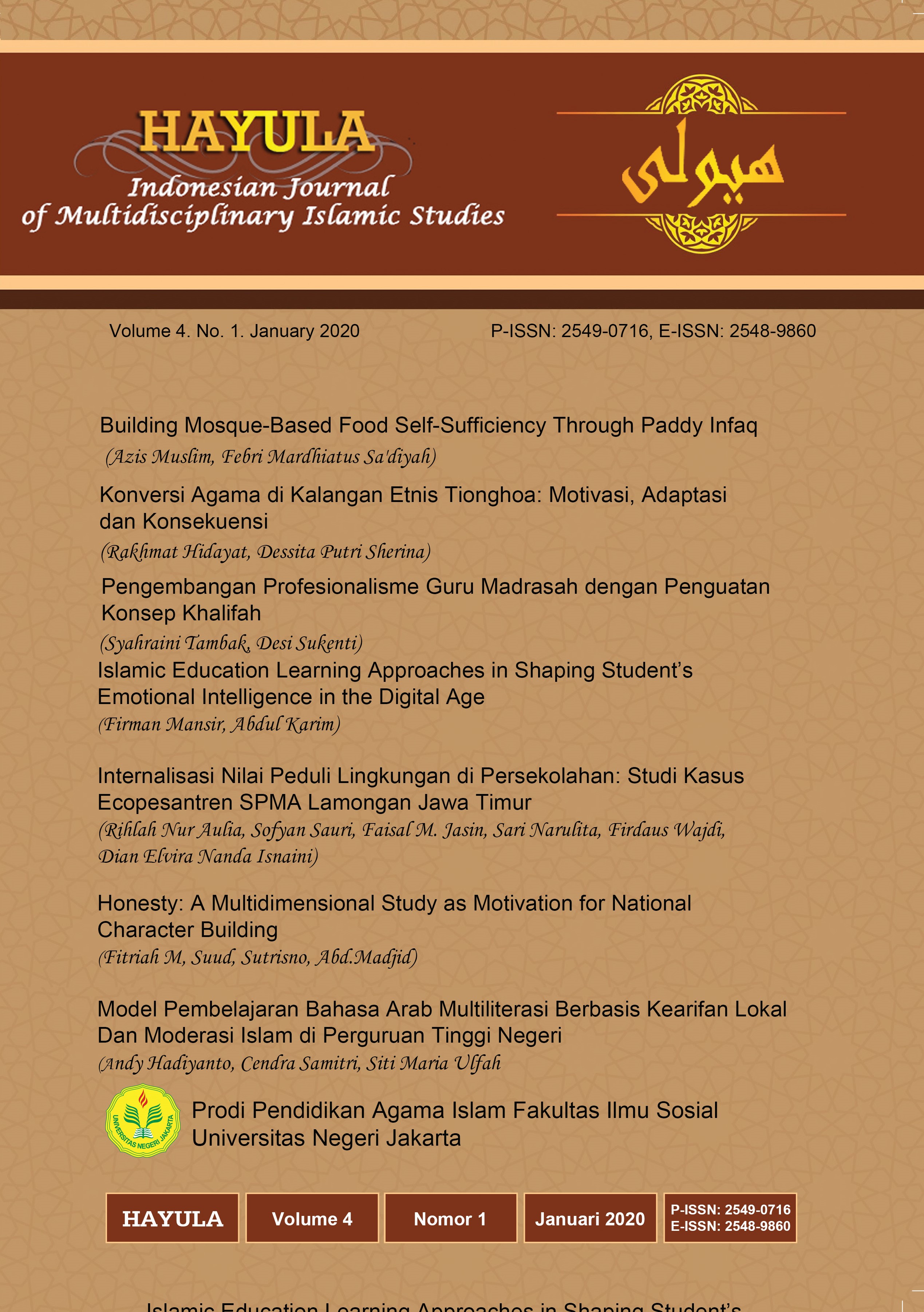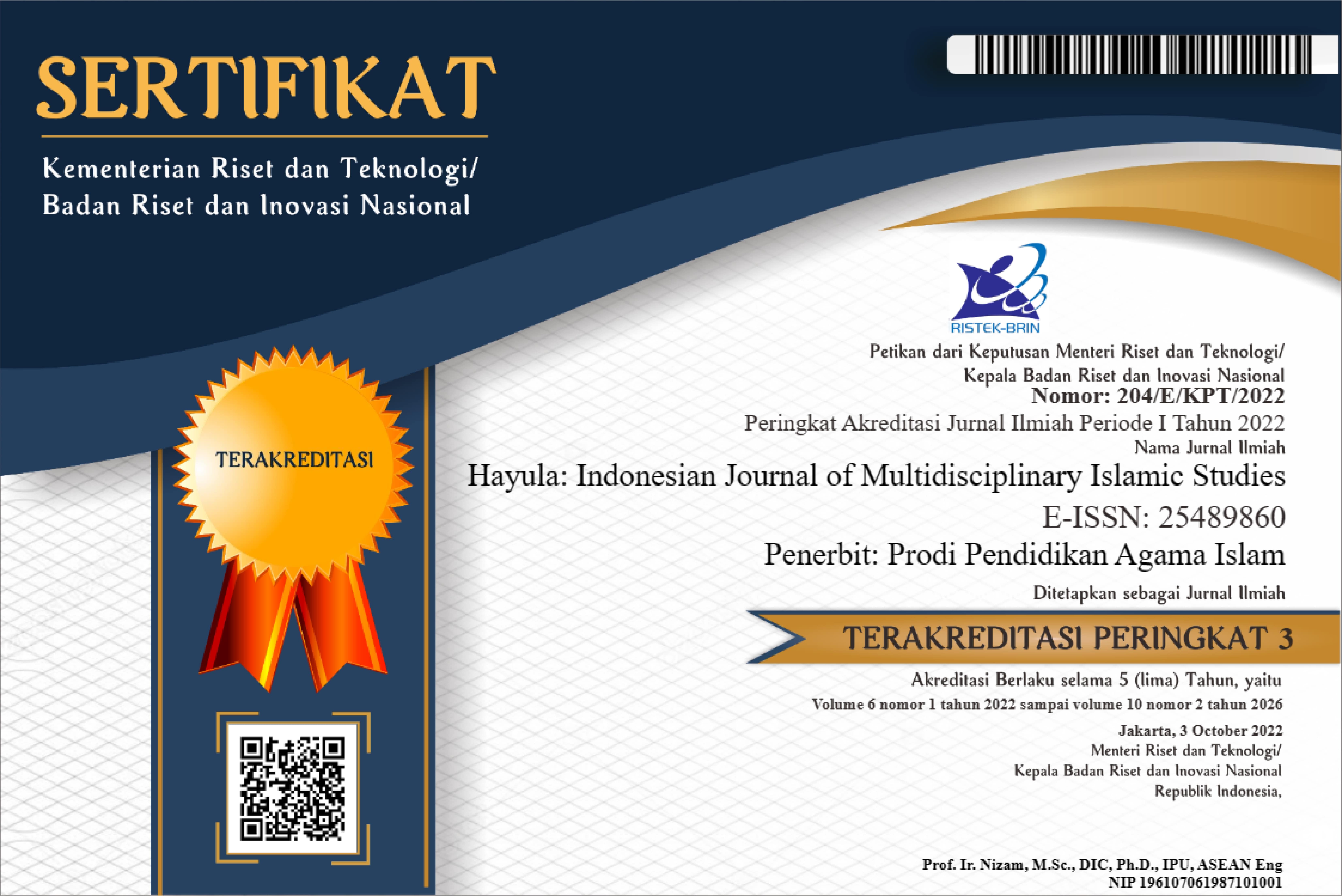Honesty: A Multidimensional Study as Motivation for National Character Building
DOI:
https://doi.org/10.21009/004.01.06Keywords:
motivation, multidimensional, honesty, mental health, psychologyAbstract
Honesty has discussed in various disciplines. Honesty studies have carried out to examine the relationship of honesty with many factors that influence certain fields of science. This study aims to present a multidimensional study to convey the goodness of honesty as a tangible manifestation of the normative message that honesty guide to goodness and it will lead to happiness. This study uses a text analysis method in the form of a literature review through searching several resources. The sources that found is analysed by Wilson's procedure. The results of this study shows that honesty as a whole has a good impact on the physical health and mental health of individuals. Honesty related to many psychological attributes. Therefore, it recommended embedding motivations in educational honesty that concluded from various scientific disciplines.
References
Baumeister, R. F., & Vohs, K. D. (2018). Revisiting Our Reappraisal of the (Surprisingly Few) Benefits of High Self-Esteem. Perspectives on Psychological Science : A Journal of the Association for Psychological Science, 13(2), 137–140. https://doi.org/10.1177/1745691617701185
Bender, J., O’Connor, A. M., & Evans, A. D. (2018). Mirror, mirror on the wall: Increasing young children’s honesty through inducing self-awareness. Journal of Experimental Child Psychology, 167, 414–422. https://doi.org/10.1016/j.jecp.2017.12.001
Carr, D. (2014). The Human and Educational Significance of Honesty as an Epistemic and Moral Virtue. Educational Theory, 64(1), 1–14. https://doi.org/10.1111/edth.12047
Cervone, D., & Pervin, L. A. (2015). Personality: Theory and research. John Wiley & Sons.
Demirci, İ., & Ekşi, H. (2018). Keep calm and be happy: A mixed method study from character strengths to well-being. Educational Sciences: Theory & Practice, 18(2).
Eijkholt, M., & Sparling, A. (2019). Health, honesty and happiness: Authenticity and anonymity in social media participation of individuals with multiple sclerosis. Multiple Sclerosis and Related Disorders, 27, 121–126. https://doi.org/10.1016/j.msard.2018.09.020
Elmahdi, I.-H. A. H. (2018). Using Technology for Formative Assessment to Improve Students’ Learning. Turkish Online Journal of Educational Technology - TOJET, 17(2), 182–188.
Fazeli, S. A., & . (2018). Honesty as a Foundational Virtue According to Islamic Mystical Ethics: Introduction and Definition. Religious Inquiries, 7(13), 17–33.
Ferreira, J. M., Amorim, K. de S., Mäkinen, M., & Moura, G. G. (2016). The Network of Meanings and Educational Psychology: Theoretical and Practical Possibilities. Procedia - Social and Behavioral Sciences, 217, 501–511. https://doi.org/10.1016/j.sbspro.2016.02.027
Frydenberg, E., & Frydenberg, E. (2017). Positive Psychology, Mindset, Grit, Hardiness, and Emotional Intelligence and the Construct of Resilience: A Good Fit with Coping. In Coping and the Challenge of Resilience (pp. 13–28). https://doi.org/10.1057/978-1-137-56924-0_2
Fuad, M. (1992). Mu’jam Mufahras li Alfazh al-Qur’an. Damaskus: Dar al-Rasyid.
Galli, G., Sirota, M., Gruber, M. J., Ivanof, B. E., Ganesh, J., Materassi, M., … Craik, F. I. M. (2018). Learning facts during aging: the benefits of curiosity. Experimental Aging Research, 44(4), 311–328. https://doi.org/10.1080/0361073X.2018.1477355
Garrett, N., Lazzaro, S. C., Ariely, D., & Sharot, T. (2016). The brain adapts to dishonesty. Nature Neuroscience, 19(12), 1727–1732. https://doi.org/10.1038/nn.4426
Gerlach, P. K. (2015). Options for improving honesty with yourself and with others. Retrieved January 29, 2020, from http://sfhelp.org/relate/keys/honesty.htm
Griggs, S. T. (2018). The Five Steps of Assertiveness. Psychological Corporation.
Gultekin, A., Ozdemir, A. A., & Budak, F. (2018). The Effect of Assertiveness Education on Communication Skills Given to Nursing Students. In International Journal of Caring Sciences (Vol. 11). Retrieved from www.internationaljournalofcaringsciences.org
Guo, Z. H., You, Z. H., Wang, Y. Bin, Yi, H. C., & Chen, Z. H. (2019). A Learning-Based Method for LncRNA-Disease Association Identification Combing Similarity Information and Rotation Forest. IScience, 19, 786–795. https://doi.org/10.1016/j.isci.2019.08.030
Hanafiy, J. (2009). At-Ta’rifat. Beirut: Dar al-Kutub al Ilmiyyah.
Hermans, H., & Hermans-Konopka, A. (2010). Dialogical self theory: Positioning and counter-positioning in a globalizing society. Cambridge University Press.
Hidayat, K. (2017). Mengapa Denmark Menjadi Salah Satu Negara Termakmur…. Retrieved October 29, 2019, from https://www.industry.co.id/read/2368/mengapa-denmark-menjadi-salah-satu-negara-termakmur-dunia
Hongwei, Y., Glanzer, P. L., Johnson, B. R., Sriram, R., & Moore, B. (2017). The association between religion and self-reported academic honesty among college students. Journal of Beliefs and Values, 38(1), 63–76. https://doi.org/10.1080/13617672.2016.1207410
Hugh-Jones, D. (2016). Honesty, beliefs about honesty, and economic growth in 15 countries. Journal of Economic Behavior and Organization, 127, 99–114. https://doi.org/10.1016/j.jebo.2016.04.012
Indonesia, T. R. K. B. B. (2002). Kamus Besar Bahasa Indonesia Edisi Ketiga. Jakarta: Balai Pustaka.
Kelly, A. E., & Wang, L. (2012). Lying Less Linked to Better Health, New Research Finds. Retrieved January 29, 2020, from https://www.apa.org/news/press/releases/2012/08/lying-less
Lestari, S. (2013). Konsep dan Transmisi Nilai-Nilai Jujur, Rukun dan Hormat. Retrieved January 29, 2020, from http://etd.repository.ugm.ac.id/home/detail_pencarian/60366
Lickona, T. (1996). Eleven Principles of Effective Character Education. Journal of Moral Education, 25(1), 93–100. https://doi.org/10.1080/0305724960250110
Lopez, S. J., Teramoto, J., & Pedrotti, C. R. S. (2019). Positive Psychology: The Scientific and Practical Explorations of Human. Retrieved January 29, 2020, from https://books.google.co.id/books?hl=en&lr=&id=arRoDwAAQBAJ&oi=fnd&pg=PP1&dq=positive+psychology+Lopez.+Shane+J.,+2019&ots=5GfRPcMhrr&sig=W_QnU_ZsqD25ih0y9GIW0D1V5q0&redir_esc=y#v=onepage&q=positive psychology Lopez. Shane J.%2C 2019&f=false
Maréchal, M. A., Cohn, A., Ugazio, G., & Ruff, C. C. (2017). Increasing honesty in humans with noninvasive brain stimulation. Proceedings of the National Academy of Sciences of the United States of America, 114(17), 4360–4364. https://doi.org/10.1073/pnas.1614912114
Markovic, S., Iglesias, O., Singh, J. J., & Sierra, V. (2018). How does the Perceived Ethicality of Corporate Services Brands Influence Loyalty and Positive Word-of-Mouth? Analyzing the Roles of Empathy, Affective Commitment, and Perceived Quality. Journal of Business Ethics, 148(4), 721–740. https://doi.org/10.1007/s10551-015-2985-6
Morrisa. (2010). Psikologi Komunikasi. Bogor: Ghalia Indonesia.
Mujib, A. (2017). Teori Kepribadian dalam psikologi Islam. Cetakan kedua. Jakarta: Rajagrafindo Persada.
Naisaburi, A. Q. A. . (2007). Risalah Qusyairiyah, terj: Sumber Kajian Ilmu Tasawuf. Jakarta: Pustaka Amani.
Otten, D. M. (2017). Honesty-Humility and Openness to Experience as Predictors of Hypothesis Confidence Among High School Students.
Pfattheicher, S., Schindler, S., & Nockur, L. (2019). On the impact of Honesty-Humility and a cue of being watched on cheating behavior. Journal of Economic Psychology, 71, 159–174. https://doi.org/10.1016/j.joep.2018.06.004
Pletzer, J. L., Bentvelzen, M., Oostrom, J. K., & de Vries, R. E. (2019). A meta-analysis of the relations between personality and workplace deviance: Big Five versus HEXACO. Journal of Vocational Behavior, 112(November 2017), 369–383. https://doi.org/10.1016/j.jvb.2019.04.004
Pravichai, S., & Ariyabuddhiphongs, V. (2018). Transformational leadership and turnover intention: the mediating effects of right speech (Samma Vaca) and trust in the leader. Journal of Management, Spirituality and Religion, 15(3), 253–272. https://doi.org/10.1080/14766086.2017.1417892
Prihartono, N. (2013). Model Pendidikan Karakter Melalui Pembelajaran Bahasa Inggris di SMA Negeri dengan Pendektan Holistik-Integratif. Universitas Muhammadiyah Yogyakarta.
Qutb, S. (2004). Fī ẓilāl al-Qur’ān. Islamic Foundation.
Rose-Ackerman, Susan, and B. J. P. (2016). Corruption and government: Causes, consequences, and reform. Cambridge university press.
Saifullah, M. (2011). Etika Bisnis Islami Dalam Praktek Bisnis Rasulullah. Walisongo: Jurnal Penelitian Sosial Keagamaan, 19(1), 127. https://doi.org/10.21580/ws.19.1.215
Shihab, Q. (1996). Wawasan Al-Quran. Bandung: Mizan.
Shihab, Q. (2002). Tafsir al-misbah. Jakarta: Lentera Hati.
Sorić, I., Penezić, Z., & Burić, I. (2017). The Big Five personality traits, goal orientations, and academic achievement. Learning and Individual Differences, 54, 126–134. https://doi.org/10.1016/j.lindif.2017.01.024
Sosik, J. J., Chun, J. U., Ete, Z., Arenas, F. J., & Scherer, J. A. (2018). Self-control Puts Character into Action: Examining How Leader Character Strengths and Ethical Leadership Relate to Leader Outcomes. Journal of Business Ethics, 1–17. https://doi.org/10.1007/s10551-018-3908-0
Staats, S., Hupp, J., & Wallace, H. (2008). Honesty and heroes: A positive psychology view of academic heroes. APA 116th Annual Convention, Boston, Massachusetts, August 14-17, 2008, 142(4), 357–372. https://doi.org/http://dx.doi.org/10.1037/e489002008-001
Suarta, I. M. (2018). Nilai-nilai Filosofis Didaktis, Humanistis, dan Spiritual dalam Kesenian Tradisional Macapat Masyarakat Bali. Mudra Jurnal Seni Budaya, 33(2), 191. https://doi.org/10.31091/mudra.v33i2.364
Suud, F. M. (2018). Kepemimpinan Transformasional dan Implikasinya pada Pembentukan Budaya Jujur di Sekolah. Sukma: Jurnal Pendidikan, 2(2), 261–286. https://doi.org/10.32533/02206.2018
Suyanto, T., Zen, I. M., Prasetyo, K., Isbandono, P., Gamaputra, G., & Purba, I. P. (2018). The study perception of social sciences and law faculty students for hoax in social media. Journal of Physics: Conference Series, 953(1). https://doi.org/10.1088/1742-6596/953/1/012151
Syaodih, E., & Handayani, H. (2017). Developing Assertive Ability of Young Children as a Countermeasure Effort for Bullying Behaviour. https://doi.org/10.2991/icece-16.2017.28
Tangney, J. P., Baumeister, R. F., & Boone, A. L. (2004). High Self-Control Predicts Good Adjustment, Less Pathology, Better Grades, and Interpersonal Success. Journal of Personality, 72(2), 271–324. https://doi.org/10.1111/j.0022-3506.2004.00263.x
Torka, N. (2018). Honesty and genuine happiness. British Journal of Guidance & Counselling, 0(0), 1–10. https://doi.org/10.1080/03069885.2018.1453600
Visãrado, P. (2018). An Application Of The Four Buddhist Principles Of Development (Bhāvanā) In Balancing Life For The Elderly Persons In Modern Society. Journal of Buddhist Education and Research, 2(2), 69–76.
Wells, D. D., & Molina, A. D. (2017). The truth about honesty. Journal of Public and Nonprofit Affairs, 3(3), 292–308. https://doi.org/10.20899/jpna.3.3.292-308
Wilson, A. T. (2018). Honesty as a Virtue. Metaphilosophy, 49(3), 262–280. https://doi.org/10.1111/meta.12303
Wu, H., Denna, T. H., Storkersen, J. N., & Gerriets, V. A. (2019, February 1). Beyond a neurotransmitter: The role of serotonin in inflammation and immunity. Pharmacological Research, Vol. 140, pp. 100–114. https://doi.org/10.1016/j.phrs.2018.06.015
Xu, W., Oei, T. P., Liu, X., Wang, X., & Ding, C. (2016). The moderating and mediating roles of self-acceptance and tolerance to others in the relationship between mindfulness and subjective well-being. Journal of Health Psychology, 21(7), 1446–1456. https://doi.org/10.1177/1359105314555170
Yunus, M. (1990). Kamus Arab-Indonesia. Jakarta: Hilda Karya.
Additional Files
Published
How to Cite
Issue
Section
License
Authors who publish with this Journal agree to the following terms:
- Author retain copyright and grant the journal right of first publication with the work simultaneously licensed under a creative commons attribution licensethat allow others to share the work within an acknowledgement of the work’s authorship and initial publication of this journal.
- Authors are able to enter into separate, additional contractual arrangementfor the non-exclusive distribution of the journal’s published version of the work (e.g. acknowledgement of its initial publication in this journal).
- Authors are permitted and encouraged to post their work online(e.g. in institutional repositories or on their websites) prior to and during the submission process, as it can lead to productive exchanges, as well as earlier and greater citation of published works.
Users/public use of this website will be licensed to CC BY







